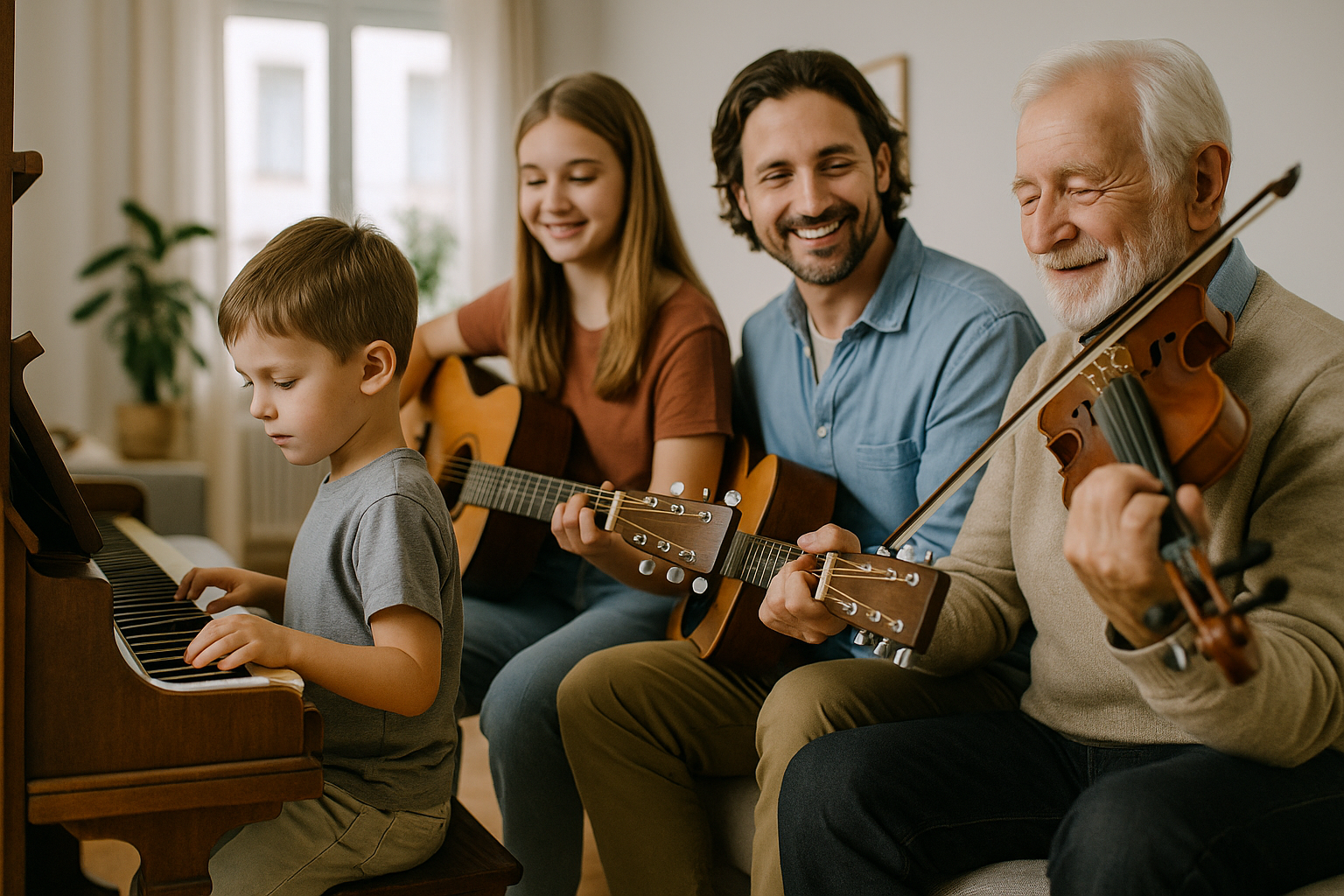If you’ve ever wondered whether you’re “too old” or if your child is “too young” to start learning music, you’re not alone. It’s a common question — and one that doesn’t have a single answer. While there are certainly advantages to starting young, it’s never too late (or too early) to begin your musical journey.
In this article, we’ll explore how age affects music learning, what benefits different age groups experience, and why the “best age” might just be the one you are right now.
The Truth: You Can Learn Music at Any Age
Let’s start with this important truth: anyone, at any age, can learn music. The idea that you must start young to become a musician is a myth.
Children, teens, adults, and seniors each bring different strengths to the learning process:
- Children absorb quickly and develop strong long-term musical instincts.
- Teens tend to be highly motivated and tech-savvy learners.
- Adults bring discipline, emotional expression, and self-awareness.
- Older adults benefit from music’s mental and emotional health rewards.
There is no age limit for creativity — and music is one of the most creative skills you can build.
Starting Music at a Young Age (3–10 years old)
Advantages:
- Brain development: Early music education strengthens memory, attention, and language skills.
- Ear training: Young children develop excellent pitch recognition.
- Confidence: Performing and learning early builds lifelong self-esteem.
- Muscle memory: Starting young helps with motor skill development.
Things to consider:
- Very young kids (3–5) may benefit more from exploratory music play than structured lessons.
- Piano, ukulele, and voice are great starter instruments.
- Lessons should be short, fun, and interactive.
Best approach:
Use games, songs, movement, and simple instruments. The goal at this age is to build a love for music — not pressure for perfection.
Learning Music as a Teenager (11–17 years old)
Advantages:
- Faster learning curve: Teens have better attention span and fine motor control.
- Emotional expression: Music becomes a creative outlet during a transformative time.
- Stronger motivation: Teens often choose their own instrument or music style.
- Technology: They can use apps, software, and online tools to speed up progress.
Things to consider:
- Teens can handle more structured lessons.
- They may compare themselves to others — encouragement is important.
- A mix of fun, challenge, and self-expression works best.
Best approach:
Let teens pick the instrument and genre they connect with. Encourage them to set personal goals (record a song, play in a school group, post on social media, etc.).
Starting Music as an Adult (18–60 years old)
Advantages:
- Discipline and focus: Adults are more consistent in practice habits.
- Self-direction: You can choose your path and pace.
- Deeper emotional connection: Music becomes a tool for stress relief and joy.
- Goal setting: Adults often learn with clear goals in mind.
Things to consider:
- Adults may feel self-conscious or fear they’re “too late.”
- Work, family, and responsibilities can make scheduling tricky.
- Physical factors (like finger flexibility) might require some adaptation — but not limitation.
Best approach:
Start with realistic expectations and focus on enjoyment. Practice regularly in short sessions, and don’t compare your progress to others. It’s your journey.
Apps, YouTube lessons, and flexible online courses make learning easier than ever for adults.
Learning Music Later in Life (60+ years old)
Advantages:
- Mental stimulation: Music helps maintain memory and cognitive function.
- Emotional fulfillment: Playing music is deeply rewarding at any age.
- Time for practice: Many seniors finally have the time to pursue long-held musical dreams.
Things to consider:
- Joint stiffness, eyesight, or hearing may require small adjustments (like font size or adaptive instruments).
- Learning pace may be slower — but retention is often stronger.
Best approach:
Choose a low-pressure learning method. Focus on music you love. Consider group lessons or jam sessions to add a social element. Celebrate progress at every stage.
How Age Affects the Type of Instrument
While any instrument can be learned at any age, certain instruments may suit some age groups better due to physical, emotional, or developmental factors.
Children:
- Ukulele (small size, soft strings)
- Piano (easy visual layout)
- Percussion or rhythm instruments
- Voice (simple songs)
Teens:
- Guitar (expressive and versatile)
- Drums (great for energy and coordination)
- Piano (continued development)
- Singing (voice starts to mature)
Adults:
- Guitar, piano, voice — all excellent choices
- Violin or wind instruments — with focused time and instruction
- Digital production — great for creative expression and composing
Seniors:
- Piano or keyboard (gentle on joints)
- Ukulele or classical guitar (soft strings)
- Voice — especially for group singing or choir
- Harmonica or melodica (light, portable)
Choose what excites you — age is just one factor.
Myths About Age and Music Learning
Let’s clear up some common misconceptions:
❌ “I’m too old to learn music.”
Truth: Many people learn instruments in their 40s, 60s, even 80s — and enjoy every minute.
❌ “Children learn faster, so it’s not worth starting late.”
Truth: Children may absorb quickly, but adults understand structure, motivation, and goal-setting better.
❌ “If you didn’t start as a kid, you’ll never be great.”
Truth: Some of the most expressive, creative musicians started later in life. Mastery isn’t limited by age.
Final Thoughts: The Best Age Is Now
So what’s the best age to start learning music?
The age you are right now.
Whether you’re 6, 16, or 66, you can start learning today. The earlier you start, the more time you have to grow — but it’s never too late to enjoy the benefits of music.
Choose an instrument that excites you. Make time for small, consistent practice. And enjoy the incredible journey that music offers — one note at a time.
